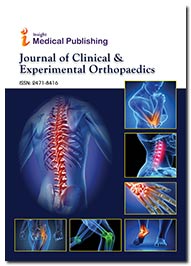Innovation in the Fight Against Musculoskeletal Diseases
Maxine Sheets Johnstone
Department of Philosophy, University of Oregon, Eugene oregon, USA
Published Date: 2024-02-07DOI10.36648/2471-8416.10.1.269
Maxine Sheets Johnstone*
Department of Philosophy, University of Oregon, Eugene oregon, USA
- *Corresponding Author:
- Maxine Sheets Johnstone
Department of Philosophy,
University of Oregon, Eugene oregon,
USA,
E-mail: mj@uoregn.edu
Received date: January 05, 2024, Manuscript No. IPJCEOP-24-18772; Editor assigned date: January 09, 2024, PreQC No. IPJCEOP-24-18772 (PQ); Reviewed date: January 24, 2024, QC No. IPJCEOP-24-18772; Revised date: January 31, 2024, Manuscript No. IPJCEOP-24-18772 (R); Published date: February 07, 2024, DOI: 10.36648/2471-8416.10.1.269
Citation: Johnstone SM (2024) Innovation in the Fight Against Musculoskeletal Diseases. J Clin Exp Orthopr Vol.10 No.1: 269.
Description
Musculoskeletal diseases cast a long shadow, affecting millions of lives worldwide and imposing a significant burden on individuals, families and healthcare systems. From arthritis and osteoporosis to back pain and fractures, these conditions encompass a spectrum of disorders that impair mobility, cause pain and diminish quality of life. In this opinion piece, we advocate for greater awareness, collaboration and innovation in the fight against musculoskeletal diseases, aiming to empower individuals and communities to overcome these challenges and live life to the fullest.
Musculoskeletal disorders
Musculoskeletal diseases represent a silent epidemic, often overshadowed by more visible and high-profile health concerns. Yet, the impact of these conditions is far-reaching, affecting people of all ages, backgrounds and walks of life. Whether it's the elderly individual struggling with osteoarthritis or the young athlete sidelined by a sports injury, musculoskeletal diseases exact a toll on physical health, mental well-being and overall productivity. Moreover, the economic burden of musculoskeletal disorders is staggering, encompassing healthcare costs, lost wages and diminished quality of life. One of the defining characteristics of musculoskeletal diseases is their multifactorial nature, with a myriad of genetic, environmental and lifestyle factors contributing to their development and progression. While genetics may predispose individuals to certain conditions, modifiable risk factors such as obesity, sedentary behavior and poor ergonomics play a significant role in exacerbating musculoskeletal disorders. Addressing these risk factors requires a comprehensive, multifaceted approach that encompasses education, prevention and early intervention. Furthermore, musculoskeletal diseases highlight the need for greater integration and collaboration across disciplines within the healthcare ecosystem. Orthopedic surgeons, rheumatologists, physiotherapists and primary care physicians must work hand in hand to provide holistic, patient-centered care that addresses the diverse needs of individuals living with musculoskeletal conditions. By fostering a culture of collaboration and knowledge-sharing, healthcare professionals can optimize treatment outcomes, reduce complications and improve overall patient satisfaction.
Rehabilitative strategies
Arthritis, a leading cause of disability, afflicts millions with chronic pain and inflammation, impairing mobility and diminishing quality of life. Osteoporosis, characterized by weakened bones prone to fracture, poses a significant threat to older adults, leading to fractures, disability and increased mortality. Meanwhile, conditions such as fibromyalgia, back pain and tendonitis contribute to a staggering burden of morbidity, affecting individuals of all ages and backgrounds. In recent years, there have been significant strides in the diagnosis, treatment and management of musculoskeletal diseases, thanks to advancements in technology, pharmacotherapy and rehabilitative strategies. From minimally invasive surgical techniques and biologic therapies to innovative imaging modalities and wearable devices, the armamentarium of musculoskeletal medicine continues to expand, offering new hope and possibilities for patients. However, access to these advancements remains uneven, with disparities in healthcare access and resources exacerbating existing inequalities in musculoskeletal care. Moreover, amidst the progress and innovation, there is a growing recognition of the importance of patient empowerment and self-management in the management of musculoskeletal diseases. Empowering individuals with knowledge, skills and resources to manage their conditions effectively can improve treatment adherence, enhance self-efficacy and foster a sense of autonomy and resilience. Patient education programs, support groups and digital health platforms offer valuable tools for empowering individuals to take an active role in their healthcare journey and achieve better outcomes. In conclusion, musculoskeletal diseases represent a formidable challenge that demands a coordinated, multidisciplinary approach grounded in compassion, innovation and community engagement. By raising awareness, fostering collaboration and advocating for equitable access to care, we can create a world where individuals living with musculoskeletal conditions can thrive, not just survive. Let us join hands in the fight against musculoskeletal diseases, empowering lives and building a future where everyone has the opportunity to live their lives to the fullest, free from the burden of musculoskeletal pain and disability.
Open Access Journals
- Aquaculture & Veterinary Science
- Chemistry & Chemical Sciences
- Clinical Sciences
- Engineering
- General Science
- Genetics & Molecular Biology
- Health Care & Nursing
- Immunology & Microbiology
- Materials Science
- Mathematics & Physics
- Medical Sciences
- Neurology & Psychiatry
- Oncology & Cancer Science
- Pharmaceutical Sciences
